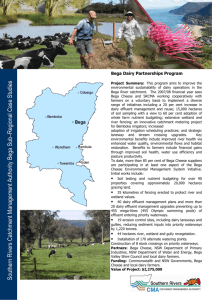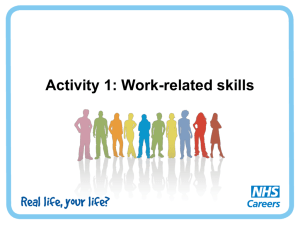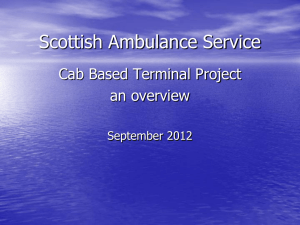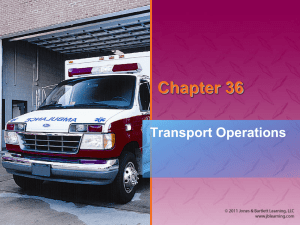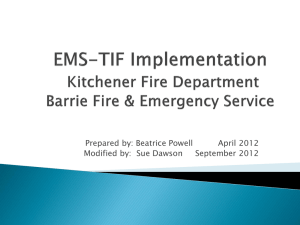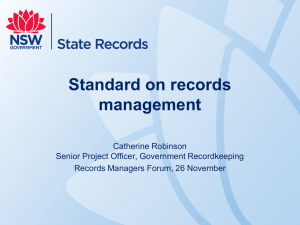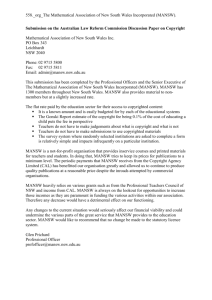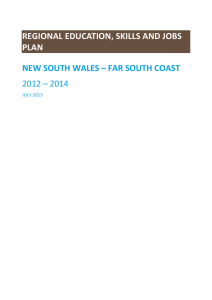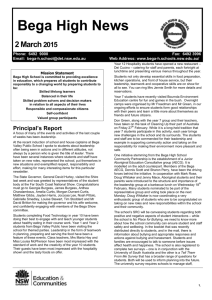October 2015
advertisement
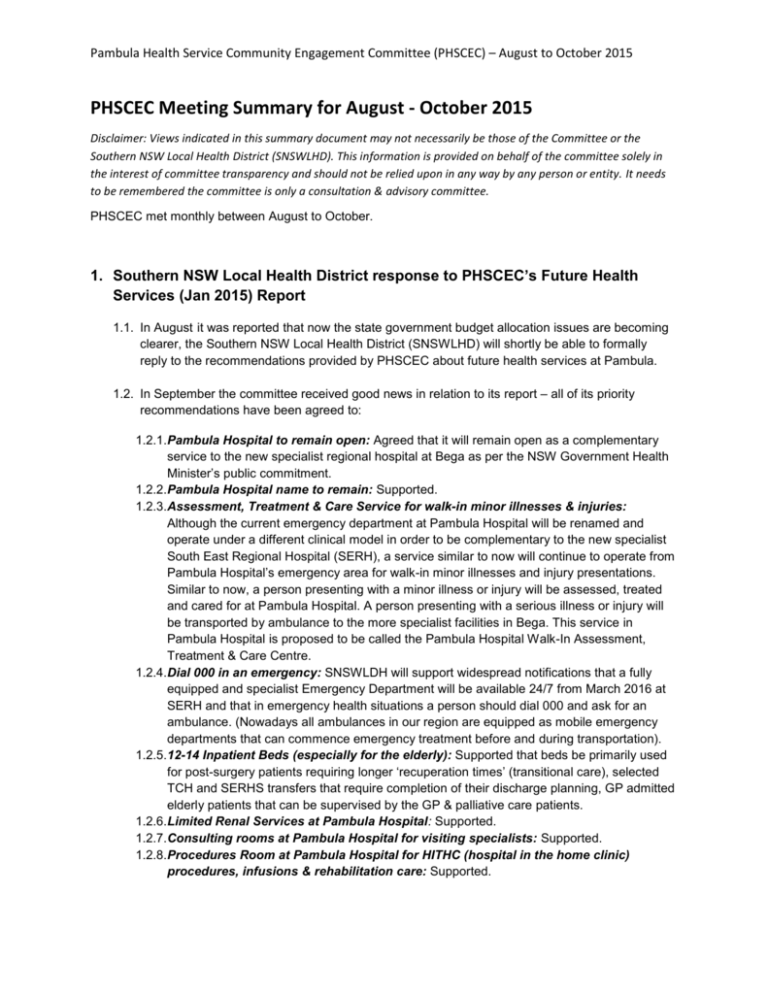
Pambula Health Service Community Engagement Committee (PHSCEC) – August to October 2015 PHSCEC Meeting Summary for August - October 2015 Disclaimer: Views indicated in this summary document may not necessarily be those of the Committee or the Southern NSW Local Health District (SNSWLHD). This information is provided on behalf of the committee solely in the interest of committee transparency and should not be relied upon in any way by any person or entity. It needs to be remembered the committee is only a consultation & advisory committee. PHSCEC met monthly between August to October. 1. Southern NSW Local Health District response to PHSCEC’s Future Health Services (Jan 2015) Report 1.1. In August it was reported that now the state government budget allocation issues are becoming clearer, the Southern NSW Local Health District (SNSWLHD) will shortly be able to formally reply to the recommendations provided by PHSCEC about future health services at Pambula. 1.2. In September the committee received good news in relation to its report – all of its priority recommendations have been agreed to: 1.2.1.Pambula Hospital to remain open: Agreed that it will remain open as a complementary service to the new specialist regional hospital at Bega as per the NSW Government Health Minister’s public commitment. 1.2.2.Pambula Hospital name to remain: Supported. 1.2.3.Assessment, Treatment & Care Service for walk-in minor illnesses & injuries: Although the current emergency department at Pambula Hospital will be renamed and operate under a different clinical model in order to be complementary to the new specialist South East Regional Hospital (SERH), a service similar to now will continue to operate from Pambula Hospital’s emergency area for walk-in minor illnesses and injury presentations. Similar to now, a person presenting with a minor illness or injury will be assessed, treated and cared for at Pambula Hospital. A person presenting with a serious illness or injury will be transported by ambulance to the more specialist facilities in Bega. This service in Pambula Hospital is proposed to be called the Pambula Hospital Walk-In Assessment, Treatment & Care Centre. 1.2.4.Dial 000 in an emergency: SNSWLDH will support widespread notifications that a fully equipped and specialist Emergency Department will be available 24/7 from March 2016 at SERH and that in emergency health situations a person should dial 000 and ask for an ambulance. (Nowadays all ambulances in our region are equipped as mobile emergency departments that can commence emergency treatment before and during transportation). 1.2.5.12-14 Inpatient Beds (especially for the elderly): Supported that beds be primarily used for post-surgery patients requiring longer ‘recuperation times’ (transitional care), selected TCH and SERHS transfers that require completion of their discharge planning, GP admitted elderly patients that can be supervised by the GP & palliative care patients. 1.2.6.Limited Renal Services at Pambula Hospital: Supported. 1.2.7.Consulting rooms at Pambula Hospital for visiting specialists: Supported. 1.2.8.Procedures Room at Pambula Hospital for HITHC (hospital in the home clinic) procedures, infusions & rehabilitation care: Supported. Pambula Health Service Community Engagement Committee (PHSCEC) – August to October 2015 1.2.9.As many SERH Pre-Admission clinics for patients from the far south coast be conducted at Pambula Hospital as possible: Supported. 1.2.10. That as broad a range of outpatient services be conducted at Pambula Hospital as possible: Supported. 1.2.11. Health Prevention & Screening services at Pambula to continue: Supported. 1.2.12. Community Nursing Services at Pambula to continue: Supported. 1.2.13. Community Health Onsite & Outreach Services to continue: Supported. 1.2.14. Child & Adolescent Health Services, Mental Health Services, Drug & Alcohol Health Services and Public Health Dental Services to continue to be provided out of Pambula: Supported. 1.2.15. Support for transitional care beds, respite care beds and palliative care beds in local aged care facilities: Supported. 1.2.16. Ensure patient transfers between SERH & Pambula Hospital are both clinically effective and patient centric: Supported. SNSWLHD will continue to provide quality inpatient transport to the extent their budget allows. 1.2.17. There be excellent customer service & teamwork at Pambula: Supported. 1.2.18. That all services, both at Pambula and the SERH precincts, are ability focused and culturally sensitive and appropriate: Supported. 1.2.19. That technology services at Pambula adequately match clinical services to be provided: Supported. 1.2.20. That health services between SERH & Pambula be well integrated, well coordinated and well supported to ensure patients experience a seamless service between the two precincts: Supported. 1.2.21. Future services at Pambula typically impacted by tourist influx periods are structured in such a way that they can be quickly ‘ramped up’ to cope with predictable increased demand: Supported. 1.2.22. SNSWLHD continue to have in place an adequate & workable crisis and disaster management plan for the far south coast region: Supported. 1.2.23. Ensure future community input into health services planning for the communities of the far south coast: Supported. 1.2.24. Investigate options for better support of volunteers at Pambula Hospital: Supported. 1.2.25. Actively assist with succession planning for health professionals on the far south coast: Supported. 1.2.26. Improve non ambulance patient transport between & from hospital: Supported. 1.3. The following recommendations of PHSCEC were either acknowledged or not agreed to by SNSWLHD at this time: 1.3.1.SNSWLHD ensure there are an adequate number of ambulances and trained emergency paramedics on the far south coast and that the ambulance service is sufficiently resourced to consistently provide a quick response capability throughout the far south coast: Concern acknowledged but SNSWLHD has no control over ambulance planning although it does provide advice to the Ambulance Service when appropriate. In this regard SNSWLHD has been advised that the far south coast enjoys an above average level of ambulance coverage compared to the rest of NSW. 1.3.2.SNSWLHD do what it can to support the establishment of a walk-in treatment & care service in Eden for the southern communities (perhaps in conjunction with the Pambula Health Service Community Engagement Committee (PHSCEC) – August to October 2015 existing Ambulance Station or existing GPs): This was not seen by SNSWLHD as a priority at the current time due to availability of GP’s & the occasional ‘walk-in’ service already available at the Ambulance Station at Eden. 1.3.3.SNSWLHD do what it can to ensure easy future transport access by patients, their carers and families to Pambula Hospital and SERHS from the southern communities of the Bega Valley: Issue acknowledged and although SNSWLHD is not responsible for patient, family & carer transport access to its services it will work with a range of transport providers to try & ensure its services are accessible. 1.3.4.SNSWLHD make active representations to relevant Authorities to ensure there is good & safe road access to the South East Regional Health Service (SERHS), including signage, for people travelling to SERHS from the south: Recommendation acknowledged but SNWLHD considers road access to SERH is suitable as is. 1.3.5.Investigate ‘win-win’ health support services onsite at Pambula (eg private health services or laundry services etc): Recommendation acknowledged but not considered by SNSWLHD a priority at this time. 1.3.6.Reconstitute at Pambula an onsite Day Centre for the Elderly: Limited support only from SNSWLHD other than ‘in principle’ due to funding responsibilities having been transferred to the Commonwealth. 2. Future Service Profile for Pambula Hospital: Discussion covered the following: The specific Service Profile of Pambula Hospital has to be finalised in order to have effective transition planning. This also involves agreement as to the future clinical model at Pambula Hospital. The General Manager of Bega Valley Health Service (Heather Austin) is already in the process of discussing the future medical model with the staff medical council, relevant GPs, nursing and other appropriate people. The proposed service profile and transition plan will come back to the Committee for its feedback. 3. Capital Works Planning for Pambula Hospital: Discussion covered the following: Although there is no new funding for capital works in financial year 2015-16, $1.6 million remains in the budget from the previous year for capital works planning and building at Pambula. Most committee members consider there will be a need to request additional capital works funding for financial year 2016-17 and beyond for Pambula Hospital. SNSWLHD has received professional advice from different sources that an expert health planner/architect be engaged to ensure a cost effective and efficient approach which would incorporate future directions of health infrastructure planning at Pambula. Depending on whether SNSWLHD or the state health infrastructure unit will have control of the build, there may be a few temporary ‘User Groups” groups set up to provide user feedback into the works. Such ‘user input groups’ may cover: o Clinical model of care o Service delivery Pambula Health Service Community Engagement Committee (PHSCEC) – August to October 2015 o Buildings. PHSCEC reinforced to SNSWLHD representatives that the priorities for capital works that the community wants to see are: o State of the art Walk-in Assessment, Treatment & Care Centre with an enlarged waiting room for the peak summer periods o Refurbishment of patient rooms to twin bed rooms with several rooms being refurbished as single bed rooms o Consulting rooms for visiting specialists and SERH pre-admission clinics o Suitably equipped supervised self care renal dialysis room o A procedures room for HITH Clinics, infusions and rehabilitation care. Other refurbishments suggested by the staff of Pambula Hospital include better patient entry, a new nurse call system, carpet replacement with vinyl, repainting and an improved vehicle turning circle. 4. Integrated Southern Health Transport Strategy (ISHTS) The need for an ISHTS continued as a topic of discussion with SNSWLHD representatives through August to October. Representatives of both PHSCEC and SNSWLHD attended the Bega Valley regional transport working group meeting convened by the Regional Co-ordinator from Transport NSW. Although transport is not health’s core business SNSWLHD is, in line with PHSCEC’s recommendation, actively working with other agencies to encourage them to provide adequate community transport services to both SERH and Pambula Hospital into the future. In this regard SNSWLHD is in the process of developing an integrated transport strategy. The importance of this issue for the southern communities within the Shire was again reinforced by PHSCEC representatives. It was noted that our local community has an ageing population and also has many people of limited means unable to afford expensive transport options or commercial accommodation in order to visit a hospital. The Committee awaits the draft transport strategy. 5. Ensuring ongoing committee ‘best practice’: Dr Rob Morton, GP and Chair of the Pambula Hospital Staff Medical Council was welcomed as a committee member. An annual review of core committee documents was completed. 6. Update from the SNSWLHD Board: PHSCEC was advised that the CEO of SNSWLHD, Max Alexander, has decided not to extend his contract beyond 31st December 2015. SNSWLHD is currently in the process of recruiting a new CEO. If the appointment is not made by 31st December Max may stay on for a few weeks and inhouse officers will act as interim CEO until the new CEO is appointed. Pambula Health Service Community Engagement Committee (PHSCEC) – August to October 2015 7. Planning for Next Meetings: The committee plans to meet in November/December. For more information contact the Committee Secretariat Heather Austin at heather.austin@gsahs.health.nsw.gov.au or on phone 6492 9108. Les Stahl, Independent Chair.
